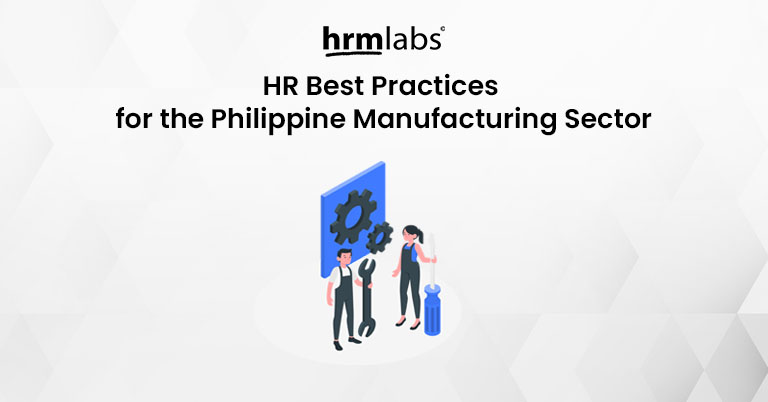The manufacturing industry in the Philippines is a vital economic driver, employing a substantial portion of the workforce. It drives growth, generates employment, and contributes significantly to the country’s GDP.
However, the industry faces unique challenges, particularly in managing human resources. Effective HR practices are essential to ensure a productive, motivated, and compliant workforce in this sector. This article explores some of the best HR practices tailored specifically for the manufacturing sector in the Philippines.
Why HR Practices Matter in Manufacturing
In the manufacturing industry, where efficiency and productivity are paramount, the role of human resources cannot be overstated. A well-managed workforce directly impacts product quality, production timelines, and overall business profitability. Conversely, poor HR practices can lead to high turnover rates, safety incidents, and compliance issues, all of which can disrupt operations and harm a company’s reputation.
Prioritize Employee Safety and Well-being
Safety is a top priority in the manufacturing sector due to the inherent risks involved in the production process. Ensuring a safe working environment is not only a legal obligation under Philippine labor laws but also a crucial aspect of employee retention and satisfaction.
- Implement Regular Safety Training: Continuous training on safety protocols and the proper use of machinery is essential. Regular drills and updates on safety measures help prevent accidents and ensure that employees are well-prepared to handle emergencies.
- Promote a Safety-First Culture: Encourage employees to report safety hazards and near-miss incidents. Creating an environment where safety is everyone’s responsibility can significantly reduce workplace accidents.
Invest in Employee Development and Training
The manufacturing sector often requires specialized skills that need continuous updating. Investing in employee development ensures that your workforce remains competitive and adaptable to new technologies and processes.
- Technical Skills Training: Regularly assess the skills of your workforce and provide training programs that enhance their technical abilities. This can range from machine operation to new manufacturing technologies.
- Leadership Development: Identify potential leaders within your workforce and provide them with the necessary training to take on supervisory roles. This not only prepares your business for growth but also improves employee morale by showing that there are clear career advancement opportunities.
Implement Fair and Competitive Compensation
In a competitive industry like manufacturing, offering fair and competitive compensation is crucial for attracting and retaining top talent. This includes not just salaries but also benefits such as healthcare, retirement plans, and performance bonuses.
- Conduct Regular Market Surveys: Ensure that your compensation packages are in line with industry standards. Regularly review and adjust salaries and benefits to remain competitive in the labor market.
- Performance-Based Incentives: Implement incentive programs that reward employees for meeting or exceeding productivity and quality targets. This not only motivates workers but also aligns their goals with those of the company.
Enhance Communication and Employee Engagement
Effective communication is key to a harmonious and productive workplace. In the manufacturing sector, where teams must work closely together, clear and open communication channels are vital.
- Regular Team Meetings: Hold regular meetings to discuss production targets, address concerns, and update employees on company policies or changes. This keeps everyone on the same page and fosters a sense of teamwork.
- Employee Feedback Mechanisms: Provide platforms for employees to voice their concerns and suggestions. This could be through regular surveys, suggestion boxes, or open-door policies with HR and management.
Ensure Compliance with Labor Laws
The manufacturing sector in the Philippines is subject to strict labor regulations, including those related to working hours, overtime pay, and employee benefits. Non-compliance can result in hefty fines and legal action, not to mention damage to the company’s reputation.
- Stay Updated on Labor Laws: HR professionals must stay informed about the latest changes in labor laws and ensure that the company’s policies are in compliance. Regular audits can help identify and address any compliance issues before they escalate.
- Fair Labor Practices: Ensure that all employees are treated fairly and that their rights are respected. This includes adhering to minimum wage laws, providing proper rest periods, and offering legally mandated benefits such as SSS, PhilHealth, and Pag-IBIG contributions.
Leverage Technology for HR Management
The manufacturing sector is increasingly adopting technology to streamline operations, and HR is no exception. Leveraging HR technology can improve efficiency, accuracy, and employee satisfaction.
- HR Management Systems: Implement an HR management system (HRMS) to automate tasks such as payroll, attendance tracking, and leave management. This reduces the administrative burden on HR staff and ensures that data is accurate and up-to-date.
- Employee Self-Service Portals: Provide employees with access to self-service portals where they can check their schedules, apply for leave, and view their payslips. This empowers employees and reduces the workload on HR departments.
Conclusion
The manufacturing sector in the Philippines is poised for growth, but this growth can only be sustained with effective HR practices in place. By prioritizing employee safety, investing in training, ensuring fair compensation, enhancing communication, and staying compliant with labor laws, companies can build a motivated and efficient workforce. Additionally, leveraging technology for HR management can further streamline operations and improve overall business performance.

